The importance of the ocean(海洋的重要性)
海洋重要性作文英语
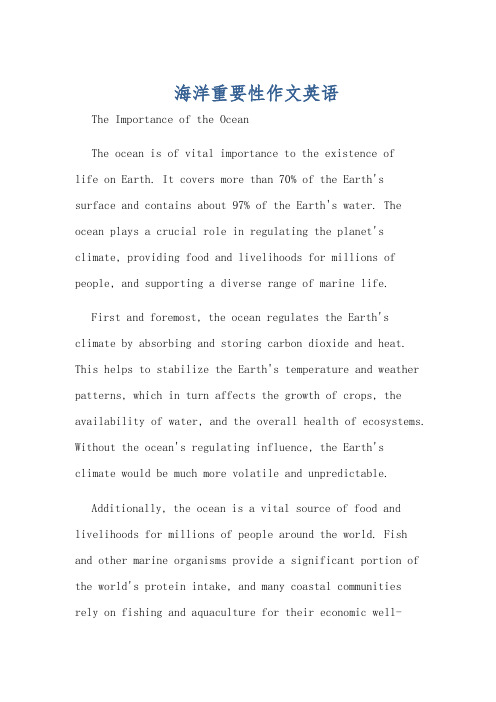
海洋重要性作文英语The Importance of the OceanThe ocean is of vital importance to the existence oflife on Earth. It covers more than 70% of the Earth's surface and contains about 97% of the Earth's water. The ocean plays a crucial role in regulating the planet's climate, providing food and livelihoods for millions of people, and supporting a diverse range of marine life.First and foremost, the ocean regulates the Earth's climate by absorbing and storing carbon dioxide and heat. This helps to stabilize the Earth's temperature and weather patterns, which in turn affects the growth of crops, the availability of water, and the overall health of ecosystems. Without the ocean's regulating influence, the Earth'sclimate would be much more volatile and unpredictable.Additionally, the ocean is a vital source of food and livelihoods for millions of people around the world. Fish and other marine organisms provide a significant portion of the world's protein intake, and many coastal communitiesrely on fishing and aquaculture for their economic well-being. Furthermore, the ocean also supports a wide range of industries, including tourism, shipping, and energy production.Furthermore, the ocean is home to an incredibly diverse array of marine life, including fish, mammals, plants, and microorganisms. This biodiversity is not only important for the health of the ocean itself, but also for the well-being of the entire planet. Many marine species play crucialroles in maintaining the balance of ecosystems, and their loss could have far-reaching and devastating consequences.In addition to these ecological and economic benefits, the ocean also provides numerous recreational and cultural opportunities for people around the world. Many people enjoy swimming, surfing, and diving in the ocean, and coastal communities often have rich cultural traditions and customs that are closely tied to the sea.In conclusion, the ocean is of immense importance to the planet and all its inhabitants. Its role in regulating the Earth's climate, providing food and livelihoods, supporting biodiversity, and offering recreational and cultural opportunities cannot be overstated. It is essential that wetake steps to protect and preserve the ocean for future generations.海洋的重要性海洋对地球上的生命存在至关重要。
海洋的重要性英语作文
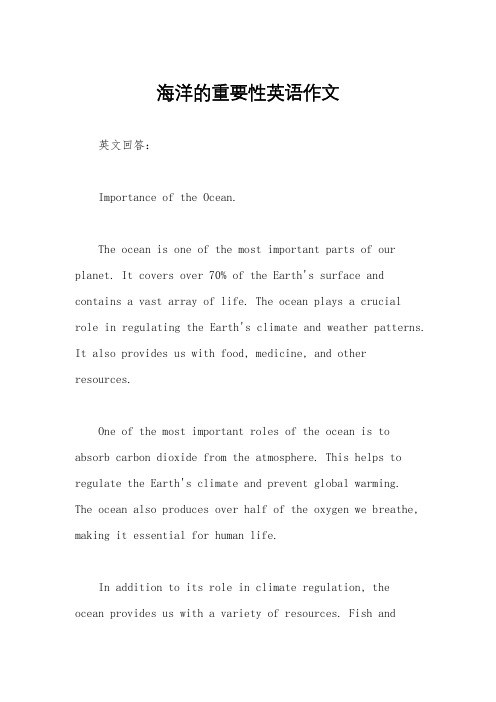
海洋的重要性英语作文英文回答:Importance of the Ocean.The ocean is one of the most important parts of our planet. It covers over 70% of the Earth's surface and contains a vast array of life. The ocean plays a crucialrole in regulating the Earth's climate and weather patterns. It also provides us with food, medicine, and other resources.One of the most important roles of the ocean is to absorb carbon dioxide from the atmosphere. This helps to regulate the Earth's climate and prevent global warming.The ocean also produces over half of the oxygen we breathe, making it essential for human life.In addition to its role in climate regulation, theocean provides us with a variety of resources. Fish andother seafood are a major source of protein for millions of people around the world. The ocean also contains minerals and other resources that are used in everything from medicine to electronics.Unfortunately, the ocean is facing a number of threats, including pollution, overfishing, and climate change. It is important that we take steps to protect the ocean and ensure that it remains a healthy and vibrant ecosystem for generations to come.中文回答:海洋的重要性。
海洋的重要性英语作文
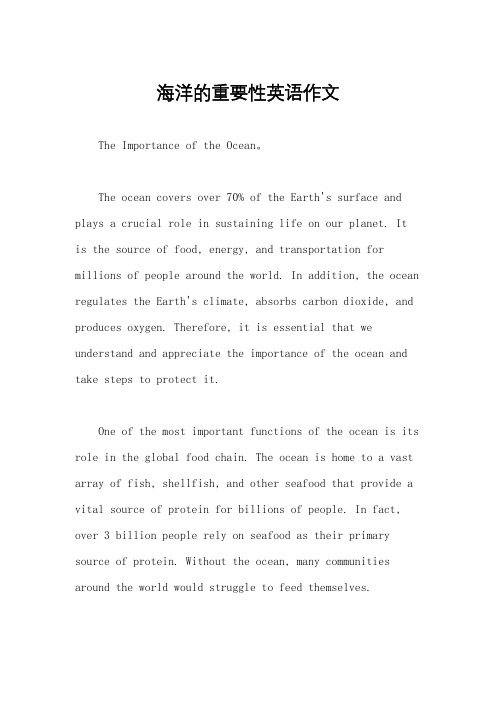
海洋的重要性英语作文The Importance of the Ocean。
The ocean covers over 70% of the Earth's surface and plays a crucial role in sustaining life on our planet. Itis the source of food, energy, and transportation for millions of people around the world. In addition, the ocean regulates the Earth's climate, absorbs carbon dioxide, and produces oxygen. Therefore, it is essential that we understand and appreciate the importance of the ocean and take steps to protect it.One of the most important functions of the ocean is its role in the global food chain. The ocean is home to a vast array of fish, shellfish, and other seafood that provide a vital source of protein for billions of people. In fact, over 3 billion people rely on seafood as their primary source of protein. Without the ocean, many communities around the world would struggle to feed themselves.In addition to being a source of food, the ocean also provides a significant source of energy. Offshore wind farms, tidal power, and wave energy are all examples of renewable energy sources that harness the power of the ocean. These sources of energy are essential for reducing our dependence on fossil fuels and mitigating the effects of climate change.The ocean also plays a critical role in transportation. Over 90% of the world's trade is carried by sea, making shipping an essential part of the global economy. The ocean provides a cost-effective and efficient way to transport goods around the world, and many countries rely on shipping to sustain their economies.Furthermore, the ocean plays a vital role in regulating the Earth's climate. The ocean absorbs and stores vast amounts of carbon dioxide, which helps to mitigate the effects of climate change. Additionally, the ocean produces oxygen through photosynthesis, which is essential for life on Earth.Despite its importance, the ocean is facing numerous threats. Pollution, overfishing, and climate change are all putting the health of the ocean at risk. Plastic pollution is a particular concern, with an estimated 8 million tons of plastic entering the ocean every year. This pollution harms marine wildlife and can even find its way into the food chain, posing a risk to human health.To protect the ocean, we must take action. Governments, businesses, and individuals all have a role to play in reducing pollution, conserving marine habitats, and promoting sustainable fishing practices. We must also take steps to mitigate the effects of climate change, such as reducing our carbon emissions and investing in renewable energy sources.In conclusion, the ocean is a vital part of our planet and plays a crucial role in sustaining life on Earth. We must understand and appreciate its importance and take steps to protect it for future generations. By working together, we can ensure that the ocean remains a healthy and vibrant ecosystem that continues to provide for us all.。
海洋对我们的重要性英语作文120字
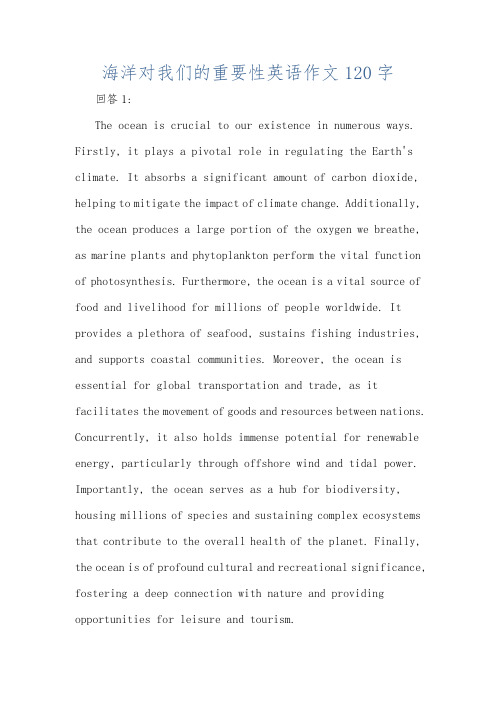
海洋对我们的重要性英语作文120字回答1:The ocean is crucial to our existence in numerous ways. Firstly, it plays a pivotal role in regulating the Earth's climate. It absorbs a significant amount of carbon dioxide, helping to mitigate the impact of climate change. Additionally, the ocean produces a large portion of the oxygen we breathe, as marine plants and phytoplankton perform the vital function of photosynthesis. Furthermore, the ocean is a vital source of food and livelihood for millions of people worldwide. It provides a plethora of seafood, sustains fishing industries, and supports coastal communities. Moreover, the ocean is essential for global transportation and trade, as it facilitates the movement of goods and resources between nations. Concurrently, it also holds immense potential for renewable energy, particularly through offshore wind and tidal power. Importantly, the ocean serves as a hub for biodiversity, housing millions of species and sustaining complex ecosystems that contribute to the overall health of the planet. Finally, the ocean is of profound cultural and recreational significance, fostering a deep connection with nature and providing opportunities for leisure and tourism.海洋对我们的存在至关重要。
研究海洋的重要性英语作文
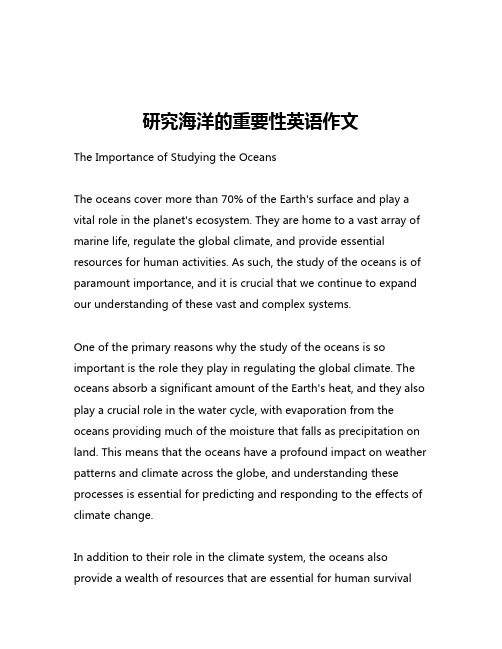
研究海洋的重要性英语作文The Importance of Studying the OceansThe oceans cover more than 70% of the Earth's surface and play a vital role in the planet's ecosystem. They are home to a vast array of marine life, regulate the global climate, and provide essential resources for human activities. As such, the study of the oceans is of paramount importance, and it is crucial that we continue to expand our understanding of these vast and complex systems.One of the primary reasons why the study of the oceans is so important is the role they play in regulating the global climate. The oceans absorb a significant amount of the Earth's heat, and they also play a crucial role in the water cycle, with evaporation from the oceans providing much of the moisture that falls as precipitation on land. This means that the oceans have a profound impact on weather patterns and climate across the globe, and understanding these processes is essential for predicting and responding to the effects of climate change.In addition to their role in the climate system, the oceans also provide a wealth of resources that are essential for human survivaland well-being. The oceans are a major source of food, with millions of people around the world relying on seafood as a primary source of protein. They also provide a range of other resources, such as minerals, energy sources, and even potential sources of new medicines and other valuable compounds.Despite the importance of the oceans, they remain poorly understood in many ways. Much of the ocean floor remains unmapped, and there is still a great deal of uncertainty about the complex interactions between the physical, chemical, and biological processes that shape the oceans. This lack of knowledge makes it difficult to effectively manage and protect these vital resources, and it also limits our ability to predict and respond to the effects of human activities on the oceans.To address these challenges, researchers around the world are engaged in a wide range of studies aimed at expanding our understanding of the oceans. These studies involve a variety of techniques, including field observations, remote sensing, and computer modeling, and they cover a broad range of topics, from the physical and chemical properties of the oceans to the complex interactions between marine ecosystems and the human activities that impact them.One area of particular importance in the study of the oceans is thefield of marine biology. Marine biologists study the diverse array of organisms that live in the oceans, from microscopic plankton to massive whales, and they are working to understand the complex relationships and interdependencies that exist within marine ecosystems. This knowledge is essential for developing effective strategies for managing and protecting these ecosystems, which are under increasing threat from a range of human activities, including overfishing, pollution, and climate change.Another important area of study in the field of oceanography is the physical and chemical processes that shape the oceans. Oceanographers study the movement of ocean currents, the distribution of temperature and salinity, and the chemical composition of seawater, among other things. This knowledge is essential for understanding the role of the oceans in the global climate system, as well as for developing effective strategies for managing and protecting marine resources.In addition to these more traditional areas of study, there is also growing interest in the potential of the oceans to provide new sources of energy and other valuable resources. For example, researchers are exploring the possibility of extracting energy from the oceans through technologies such as wave and tidal power, as well as the potential of deep-sea mining to access valuable minerals and other resources. While these technologies are still in the earlystages of development, they hold the promise of providing new sources of energy and resources that could help to meet the growing demands of a rapidly expanding global population.Overall, the study of the oceans is a critical area of research that has far-reaching implications for our understanding of the planet and our ability to manage and protect its vital resources. By continuing to expand our knowledge of the oceans, we can better understand and address the complex challenges that we face in the 21st century, from climate change to sustainable resource management. It is clear that the oceans will continue to play a central role in the future of our planet, and the study of these vast and complex systems will be essential for ensuring a sustainable and prosperous future for all.。
海洋的重要性英语四级作文
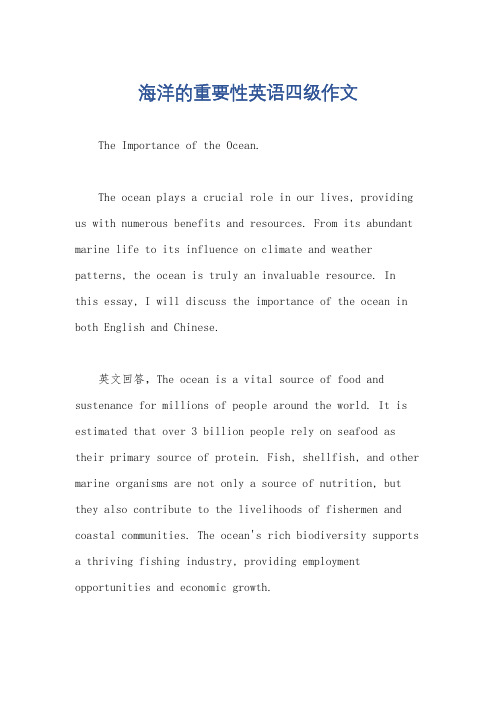
海洋的重要性英语四级作文The Importance of the Ocean.The ocean plays a crucial role in our lives, providing us with numerous benefits and resources. From its abundant marine life to its influence on climate and weather patterns, the ocean is truly an invaluable resource. Inthis essay, I will discuss the importance of the ocean in both English and Chinese.英文回答,The ocean is a vital source of food and sustenance for millions of people around the world. It is estimated that over 3 billion people rely on seafood as their primary source of protein. Fish, shellfish, and other marine organisms are not only a source of nutrition, but they also contribute to the livelihoods of fishermen and coastal communities. The ocean's rich biodiversity supports a thriving fishing industry, providing employment opportunities and economic growth.中文回答,海洋是全球数亿人口的重要食物和生计来源。
海洋的重要性,初中英语作文简单
海洋的重要性,初中英语作文简单The Importance of the OceanThe ocean is amazing! It covers most of our planet and is filled with awesome creatures and mysteries to explore. The ocean is so important for many reasons.First, the ocean produces over half of the world's oxygen. That's thanks to little marine plants called phytoplankton that live in the ocean. They take in carbon dioxide and release oxygen, just like plants and trees on land. The phytoplankton provide a huge amount of the oxygen we breathe. Without the ocean, we wouldn't have enough oxygen!Second, the ocean is home to an incredible variety of life. From tiny shrimp to giant whales, there are millions of different species living in the ocean. Many of the fish we eat, like tuna, cod, and salmon, come from the ocean. The diversity of ocean life is mind-blowing when you start learning about all the unique creatures.Another key role of the ocean is regulating our climate and weather patterns. The ocean absorbs and stores huge amounts of heat from the sun. It also drives the water cycle that produces rainfall inland. The ocean currents distribute heat around theglobe too. Without the ocean, the climate would be super extreme and unpredictable.The ocean is also a big part of the economy. Shipping and maritime trade is how most goods get transported around the world. Many people's jobs like fishing, shipbuilding, and offshore oil drilling are connected to the ocean too. Coastal tourism at beaches is another major income source for many places. The ocean provides lots of jobs and business opportunities.Unfortunately, the ocean is facing some serious threats from humans. Pollution like plastics, chemicals, and oil spills are harming marine ecosystems. Overfishing is depleting fish populations too quickly as well. Climate change is altering ocean temperatures and currents, while also causing sea level rise that floods coastal areas. We need to protect the ocean from these dangers.There's still so much of the ocean that remains unexplored too! Only about 20% of the ocean has been mapped and studied by marine scientists. Who knows what other amazing creatures and ecosystems are waiting to be discovered? The ocean depths hold many mysteries we have yet to unravel.In my opinion, the ocean is one of the most incredible and important parts of our planet. It generates oxygen for us tobreathe, houses astounding marine biodiversity, regulates the climate, drives economic activity, and still holds uncharted mysteries to explore. We need to appreciate how vital the ocean is and do more to conserve it for future generations. The ocean is truly amazing!。
海洋的重要性英语四级作文
海洋的重要性英语四级作文The Importance of the OceanAs a college professor specializing in English, I am well aware of the significance of the ocean in our lives. The ocean covers over 70% of the Earth's surface and plays a crucial role in regulating the planet's climate, providing food and livelihoods for millions of people, and supporting a vast array of biodiversity.One of the key reasons why the ocean is so important is its role in regulating the Earth's climate. The ocean absorbs a significant amount of carbon dioxide from the atmosphere, helping to mitigate the effects of climate change. Additionally, the ocean plays a vital role in the water cycle, influencing weather patterns and helping to maintain a stable climate.Furthermore, the ocean is a vital source of food and livelihoods for millions of people around the world. Fish and other marine species provide a key source of protein for many communities, and fishing and other marinerelated industries support the livelihoods of millions of people globally.In addition to its role in climate regulation and food production, the ocean also supports a vast array of biodiversity. From the tiniest plankton to the largest whales, the ocean is home to a diverse range of species that play important roles in maintaining the health of marine ecosystems. Protecting this biodiversity is essential for maintaining the ocean's health and ensuring its continued ability to support life on Earth.In conclusion, the ocean is a vital resource that plays a crucial role in regulating the Earth's climate, providing food and livelihoods for millions of people, and supporting a diverse range of species. As a college professor, I believe it is essential that we recognize the importance of the ocean and take steps to protect and preserve this invaluable resource for future generations.。
海洋探索的重要性作文英语
The Importance of Ocean ExplorationExploring the vast expanses of the ocean is crucial for our understanding of the planet we inhabit. The ocean covers more than 70% of the Earth’s surface, yet much of it remains unexplored and unknown. In this essay, we will discuss the significance of ocean exploration and why it is essential for the advancement of science and the well-being of our planet.First and foremost, ocean exploration is vital for marine research and scientific discovery. The ocean is home to a diverse array of ecosystems and species, many of which are yet to be discovered. By exploring the depths of the ocean, scientists can uncover new species, study marine habitats, and understand the complex interactions that shape marine life. This knowledge is not only fascinating but also valuable for conservation efforts and the sustainable management of marine resources.Furthermore, ocean exploration plays a critical role in understanding the Earth’s climate system. The oceans regulate global climate by absorbing and releasing heat and carbon dioxide. By studying ocean currents, temperature variations, and marine life, scientists can improve climate models and predict future changes more accurately. This information is crucial for addressing climate change and its impacts on the environment and society.In addition to scientific research, ocean exploration is essential for economic development and resource management. The ocean offers a wealth of resources, including fisheries, minerals, and energy sources. By exploring the ocean, we can identify new opportunities for sustainable resource extraction and economic growth. However, this must be done responsibly to ensure the long-term health of marine ecosystems and the livelihoods of coastal communities.Moreover, ocean exploration is key to enhancing national security and defense capabilities. The oceans are vital for global trade, communication, and transportation. By monitoring maritime activities and exploring potential threats, countries can safeguard their maritime borders and interests. Advanced ocean exploration technologies, such as underwater drones and sensors, play a crucial role in enhancing maritime surveillance and security.In conclusion, ocean exploration is of utmost importance for the advancement of science, the conservation of marine ecosystems, and the sustainable management of ocean resources. By delving into the depths of the ocean, we can unlock new knowledge, address global challenges, and ensure a brighter future for our planet. Let us continue to explore and understand the ocean, for it holds the key to our survival and prosperity.。
高考英语作文保护海洋的参考范文
高考英语作文保护海洋的参考范文Protecting the Ocean: A Call to ActionIntroduction:The ocean covers over 70% of our planet, yet it is facing serious threats from human activities such as pollution, overfishing, and climate change. As responsible citizens of the Earth, it is our duty to protect and preserve this vital ecosystem for future generations. In this essay, we will explore the importance of the ocean, the threats it faces, and what can be done to ensure its long-term health.Importance of the Ocean:The ocean plays a crucial role in sustaining life on Earth. It provides us with food, oxygen, and regulates the climate by absorbing excess carbon dioxide from the atmosphere. It is also home to a rich diversity of marine life, from tiny plankton to majestic whales. The ocean is a source of inspiration, beauty, and wonder, drawing millions of people to its shores each year.Threats to the Ocean:Despite its importance, the ocean is under threat from a variety of human activities. Pollution from plastic waste,chemicals, and oil spills is destroying marine habitats and harming wildlife. Overfishing is depleting fish populations and disrupting the balance of marine ecosystems. Climate change is causing ocean temperatures to rise, leading to coral bleaching and the loss of critical habitats.What can be done:1. Reduce plastic pollution: We can reduce our use of single-use plastics such as bags, bottles, and straws, and opt for reusable alternatives instead. Proper disposal of plastic waste and participating in beach cleanups can also help prevent plastic pollution.2. Sustainable fishing practices: Governments and fishing industries can implement regulations to limit fishing quotas, protect endangered species, and enforce sustainable fishing practices. Consumers can support sustainable seafood choices by choosing certified products.3. Combat climate change: We can reduce our carbon footprint by using energy-efficient appliances, reducing our reliance on fossil fuels, and supporting renewable energy sources such as solar and wind power. Planting trees and supporting reforestation efforts can also help absorb excess carbon dioxide from the atmosphere.4. Marine conservation: Governments, non-profit organizations, and individuals can establish marine protected areas, where fishing and other harmful activities are restricted to allow marine ecosystems to recover and thrive. Supporting conservation efforts and raising awareness about the importance of marine biodiversity can also help protect the ocean.Conclusion:The ocean is a precious resource that sustains life on Earth and provides us with countless benefits. However, it is facing serious threats from human activities that must be addressed to ensure its long-term health and vitality. By taking action to reduce pollution, promote sustainable fishing practices, combat climate change, and protect marine habitats, we can preserve the ocean for future generations to enjoy. Together, we can make a difference and ensure a healthy and thriving ocean for all.。
- 1、下载文档前请自行甄别文档内容的完整性,平台不提供额外的编辑、内容补充、找答案等附加服务。
- 2、"仅部分预览"的文档,不可在线预览部分如存在完整性等问题,可反馈申请退款(可完整预览的文档不适用该条件!)。
- 3、如文档侵犯您的权益,请联系客服反馈,我们会尽快为您处理(人工客服工作时间:9:00-18:30)。
The importance of the ocean
Covering 71% of the Earth’s surface, containing rich resources including biological resource, chemical resources, mineral resources, marine energy and marine transportation. The ocean have a great impact on human survival and development of world civilization. Practice shows that ocean is indispensable to human life and creating, and the ocean’s impact on human will increase exponentially. Just as many experts predicted, the future is marine century.
Now, the sea is suffering. The evidence abounds. It becomes acid, making marine life difficult. The dearth of some species will disrupt the food chain, which will in turn destabilize the entire ecosystem. The coral reefs, as the rainforests of the sea, are affected by overfishing, overheating, ocean acidification, etc. Most of them are therefore gravely endangered. Humans inflict too many stresses on marine ecosystem, which may permanently change the ocean. For humans, each of these changes is a catastrophe.
As we all know, the ocean is interconnected. The contamination of one piece of sea area is bound to affect other waters. Polluted waters have endangered human health, causing widespread concern of all peo ples. It’s high time to take necessary measurement to make matters right. Firstly, we need to manage the sea efficiently just as what we do to the land. Then, economics also provide some answers, liking abolishing fishing subsidies. At last, the government should take proper measures to make the people who exploit resources of the sea protect the ocean. Only if we coordinate the relationship between human and ocean, can the ocean benefit the mankind.。
